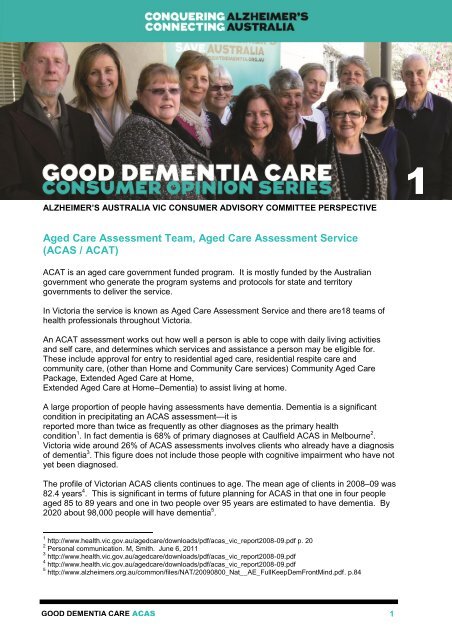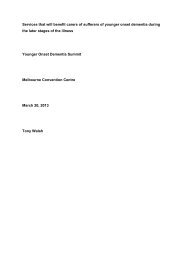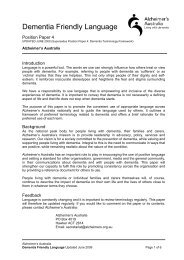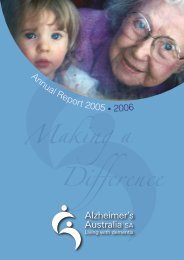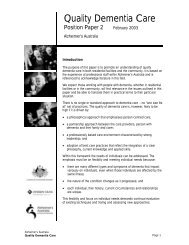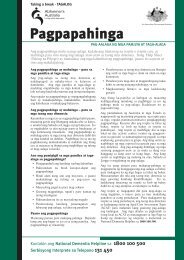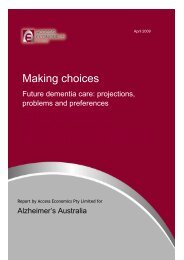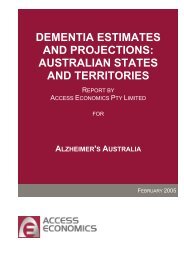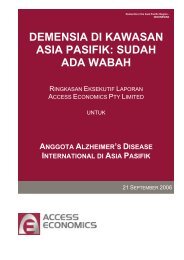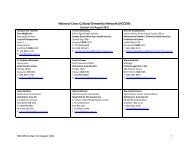Good Dementia Care 1 ACAS(PDF, 538 kB) - Alzheimer's Australia
Good Dementia Care 1 ACAS(PDF, 538 kB) - Alzheimer's Australia
Good Dementia Care 1 ACAS(PDF, 538 kB) - Alzheimer's Australia
You also want an ePaper? Increase the reach of your titles
YUMPU automatically turns print PDFs into web optimized ePapers that Google loves.
1ALZHEIMER’S AUSTRALIA VIC CONSUMER ADVISORY COMMITTEE PERSPECTIVEAged <strong>Care</strong> Assessment Team, Aged <strong>Care</strong> Assessment Service(<strong>ACAS</strong> / ACAT)ACAT is an aged care government funded program. It is mostly funded by the <strong>Australia</strong>ngovernment who generate the program systems and protocols for state and territorygovernments to deliver the service.In Victoria the service is known as Aged <strong>Care</strong> Assessment Service and there are18 teams ofhealth professionals throughout Victoria.An ACAT assessment works out how well a person is able to cope with daily living activitiesand self care, and determines which services and assistance a person may be eligible for.These include approval for entry to residential aged care, residential respite care andcommunity care, (other than Home and Community <strong>Care</strong> services) Community Aged <strong>Care</strong>Package, Extended Aged <strong>Care</strong> at Home,Extended Aged <strong>Care</strong> at Home–<strong>Dementia</strong>) to assist living at home.A large proportion of people having assessments have dementia. <strong>Dementia</strong> is a significantcondition in precipitating an <strong>ACAS</strong> assessment—it isreported more than twice as frequently as other diagnoses as the primary healthcondition 1 . In fact dementia is 68% of primary diagnoses at Caulfield <strong>ACAS</strong> in Melbourne 2 .Victoria wide around 26% of <strong>ACAS</strong> assessments involves clients who already have a diagnosisof dementia 3 . This figure does not include those people with cognitive impairment who have notyet been diagnosed.The profile of Victorian <strong>ACAS</strong> clients continues to age. The mean age of clients in 2008–09 was82.4 years 4 . This is significant in terms of future planning for <strong>ACAS</strong> in that one in four peopleaged 85 to 89 years and one in two people over 95 years are estimated to have dementia. By2020 about 98,000 people will have dementia 5 .1 http://www.health.vic.gov.au/agedcare/downloads/pdf/acas_vic_report2008-09.pdf p. 202 Personal communication. M, Smith. June 6, 20113 http://www.health.vic.gov.au/agedcare/downloads/pdf/acas_vic_report2008-09.pdf4 http://www.health.vic.gov.au/agedcare/downloads/pdf/acas_vic_report2008-09.pdf5 http://www.alzheimers.org.au/common/files/NAT/20090800_Nat__AE_FullKeepDemFrontMind.pdf. p.84GOOD DEMENTIA CARE <strong>ACAS</strong>1
What are some of <strong>ACAS</strong> strengths?Living at homeThere is no doubt people prefer to live at home with assistance and <strong>ACAS</strong> can help preventpremature or inappropriate admission to residential aged care facilities. In home assistance ishighly valued. Assessment at home creates less anxiety than an unfamiliar environment wouldevoke.Training and referral for dementia assessmentThe care needs of frail older people are comprehensively assessed by trained healthprofessionals (for example nurses, occupational therapists or social worker). Assessment staffare trained for broader comprehensive general assessment and also build on specialist skills,such as dementia, through training. Importantly many of these professionals have access to ageriatrician who can help with assessing cognitive problems such as dementia.Managers of each <strong>ACAS</strong> are networked to share information and knowledge between teams.This provides an opportunity for awareness around the issue of dementia.Consistent criteria<strong>ACAS</strong> provide criteria for service access and consistency in practice to ensure services areutilised based on need. It is acknowledged that these systems are intended to provideindependent, fair and equitable service provision. <strong>ACAS</strong> is also equipped to deal with crisessituations with a priority 1 to 3 response system.Comprehensive assessment<strong>ACAS</strong> can also promote more co-ordination of aged care and other health services. Referralsfrom a doctor, nurse or social worker assist in completing a broader assessment. Many peoplesee a doctor with a problem prior to entering the aged care service system. The GP cancommunicate all the things that are affecting a person. Similarly <strong>ACAS</strong> has the opportunity toinvolve the clients and their family carer(s) in the assessment and care planning process. Thishelps <strong>ACAS</strong> ‗piece the puzzle‘ together through the assessment process in the home, wherethey can talk with the client and the family, observe what is happening at home at the time ofthe assessment, as well as consider background information from a GP or other healthprofessional.Right of appealOne of the strengths of the ACAT program is the responsibilities under the Aged <strong>Care</strong> Act1997. This enables a right of appeal if a person disagrees with their assessment. Writteninstructions on how to appeal the ACAT decision is provided with the letter that is received afterassessment. The Department of Health and Ageing has 90 days in which to respond to anappeal.What is challenging for consumers?Consumers are still confusedThe ‗service maze‘ continues to be a source of anxiety for people. On top of the physical andemotional exhaustion of the caring role, much energy goes into trying to determine ‗who doeswhat and when‘.GOOD DEMENTIA CARE <strong>ACAS</strong>2
People access <strong>ACAS</strong> from different backgrounds and experiences with services. Some comeinto the service system from Cognitive <strong>Dementia</strong> and Memory Service, some from doctors,some from hospitals, some from Home and Community <strong>Care</strong> (HACC) and some with noexperience at all. Many only ever access <strong>ACAS</strong> when they are in crisis, needing residentialaged care. People are entering the service system with different levels of knowledge.Clear referral pathways and supported navigation of the aged care system is vital.Some typical example of consumer comments include the following:People are given snippets of info – some people could not cope with the big picture but some people dowant the big picture up front. There’s a crisis and then you’re drip fed a little more info. The governmenthas heaps of booklets but if you don’t know what you are looking for then these are not useful. Theservice is complex, the pathways are not obvious, you don’t know about what services exist 6 .Service providers may know where to refer but do not seem to tell the consumer timely andappropriately.Assessment fatigueOften people have already had comprehensive assessments and paperwork to contend withprior to accessing <strong>ACAS</strong>.I had to deal with the district nursing service, Cognitive <strong>Dementia</strong> and Memory Service, <strong>ACAS</strong>, <strong>Care</strong>rsVictoria, HACC, Commonwealth <strong>Care</strong>r Respite centre and Commonwealth <strong>Care</strong>r Resource centre,Centrelink plus GPs, physician and neurologist…I found this very stressful…a month after my husbandcame home I was drowning in paperwork and information and going round in circles…if the localhealthcare group co-ordinated the services I would not have fallen in such a big heap… 7Whilst the Victorian government has developed guidelines for streamlining pathways between<strong>ACAS</strong> and HACC assessment services to help minimise the number of times clients or theircarers have to tell their story, there is still much paperwork that is burdensome.<strong>Care</strong>r issues result in exposure to many different government departments and services withthe perpetual challenge of more coherence across program initiatives.Assessment – identify dementia but don’t pigeon holePaperwork is a necessary requirement but some consumers found the rigidity of someassessment tools led to the labeling or pigeon holing of the person they were caring forunnecessarily. For example a disagreement, over shutting curtains led to a label of aggressionbecause ‗upset‘ was not a criteria; confusion about a new environment led to documentation ofwandering.Once a person has been diagnosed with dementia often generalizations are made whenobjectivity is required. For example, a person may not be eating due to something other thandementia – gastric reflux or other issues. Behaviours of concern may be in response to theparticular environment at the time.A person with dementia is first and foremost a person and they do not wish to be defined bytheir illness.Just because you have a diagnosis of dementia does not mean you are stupid.6 Ms Judy Hogarth, former carer for her husband who had younger onset dementia.7 Ms Megan Major, former carer for her husband who had a stroke and Lewy Body dementia.GOOD DEMENTIA CARE <strong>ACAS</strong>3
LanguageMany of the concerns of family carers relate to language and how it is interpreted.The language is written for the system point of view but not the consumer. The process adds to thestress as a carer.In determining care needs, many carers use the example of ―can you feed yourself?‖ This ishighly open to interpretation. The care recipient may still be able to put a spoon in their mouthbut have no ability to make a meal. Without a carer they would not be able to feed themselves.The person with dementia may have lost insight into their own deterioration and state they arestill highly capable of feeding themselves when in fact they are not.The use of the word ‗Team‘ was also questioned. To the system this indicates amultidisciplinary approach but to the consumer can be confusing.Where was the team? My mum wanted to know when the other people were coming because she wasonly assessed by one worker?Interpretation of behaviours of concern was also a problem. One carer was told her husbandwas not eligible for an EACH-D package because he was not aggressive. In this instancebehaviours of concern was interpreted incorrectly by <strong>ACAS</strong>; interpreted as ‗angry behaviour‘.For a carer of someone with dementia there are a number of highly upsetting behaviours ofconcern including, disinhibited behaviour, sundowning, repetitive behaviours and questioning,agitation, false ideas and hallucinations and shadowing to name a few.I challenge any team that says behaviours of concern only relates to aggression. I had to turn our mainswater supply off because my husband was getting up 15 times every half hour to go to the toilet and flushas well as have many showers 8 .Variation across teams in Victoria - waiting times and service availabilityConsumers report variation of timeliness of <strong>ACAS</strong> response across Victoria. Consumers inregional areas argue that <strong>ACAS</strong> does not have equitable access to a geriatrician.The outcomes of assessment also appear to vary considerably across the teams.<strong>Dementia</strong> seems to be diagnosed more often in metropolitan than rural areas. Access to ageriatrician should provide more consistency here.System seems crises drivenIn aged care there is the (often ignored) mantra of getting everything in order and considerfuture planning. <strong>Care</strong>rs anxious to have their paperwork in place in the event of havingsomething happen to them are often discouraged by <strong>ACAS</strong>.The <strong>ACAS</strong> response system prioritizes assisting people in crises, but leaves little response forthose people planning in advance. This rightly allows for the crises that do happen but doesnot alleviate the anxiety of people who are trying to prepare for future likelihoods.8 Ms Judy Hogarth, former carer for her husband who had younger onset dementia.GOOD DEMENTIA CARE <strong>ACAS</strong>4
Furthermore, many people pride themselves on their independence and reliance on serviceproviders is a very foreign concept. People are generally not good at putting their hand up tosay they need help and may down play their struggles until they reach crisis point. <strong>ACAS</strong> cansupport people in recognizing that they need assistance earlier.Responsiveness to both carers and care recipientThe needs of family carers and the needs of the care recipient are inextricably bound.<strong>Care</strong>rs continually ask to be included in the assessment process because people with dementiamay lose insight into their reliance on other people to look after themselves. They may also beunaware of the level of carer strain.Behaviours that families may comment on may not be witnessed by <strong>ACAS</strong> at a morningappointment when people with dementia tend to be at their best (for example, sundowning is acommon feature with agitated behaviours, confusion, restlessness and even hallucinations inthe late afternoon or evening).It is acknowledged that risks versus rights of the client are a complexity that <strong>ACAS</strong> and familiesgrapple with. More regular assessment, consultative assessment and review of assessmentsmay be required.Post assessment challenges – so what happens next??There is often a large gap between assessment to determine eligibility for services andavailability of services. Clients are often faced with long waiting lists and/or services that areunavailable in their area. Clients remain distressed as to why they are left in limbo waiting.My friend’s parent was assessed by <strong>ACAS</strong> for eligibility for CACPS last October [2010]. It is now August[2011] and they are still on a waiting list but there has been major detioration so I told them to haveanother <strong>ACAS</strong> assessment. They have now been approved for an EACH -D package so they go onanother waiting list. They have been so stressed with no support available for the last 10 months. Justyesterday, however, a care provider offered them a package over the phone but they were told that thefamily would have to financially contribute $50/week in order to be considered. They are at a loss withwhat to do and what their rights and entitlements are 9 .A number of consumers have indicated a preference for a system of referral similar to a GPreferral to a specialist medical service. Despite waiting times they know exactly where to gonext.Why don’t <strong>ACAS</strong> provide referrals to specific services in their geographical area so clients know whothey can access and make arrangements? Sure, they still may have to wait, but they would not feel sopowerless. With information about wait times they might choose to make other arrangements.After the assessment a letter is sent to the client attached to a copy of the assessment.The letter states what services the client is eligible to receive. If the carer does not live with theperson, they may never know the outcomes because the client with dementia may lose ordestroy the letter.9 Ms G. Liavas. Consumer.GOOD DEMENTIA CARE <strong>ACAS</strong>5
Conclusion and next stepsPeople with dementia and their family carers are empowered if they understand the servicesystem, understand the language and know their rights. Consumers set the challenge for nextremedial steps:Promote more co-ordination of aged and health services. Provideconsumers with a list of service providers in their area who offer the servicesthat they have been assessed eligible for.Reassess language. Be dementia friendly. Include written informationexplaining the terms used in the assessment letterAssessment for low level care is required annually. Send reminder to client.Include the carer in the assessment process and care plan.<strong>ACAS</strong> follow up to ensure that the client and carer understand theinformation and what will happen next? Send a copy of the assessment letterto the carer to ensure that they are informed.If there is a ‘team’ then consumers expect to see more than one person.Help minimise anxiety. Crises are incredibly stressful. Support people inrecognizing they need assistance earlier.AcknowledgementsWith thanks to Maureen Smith, Manager of <strong>ACAS</strong> Southern Metro, <strong>ACAS</strong> VIC Chairperson for hercontribution to the round table forum.For further information please contactDianne Biermann, Policy Officer, Alzheimer’s <strong>Australia</strong> VicFebruary 2012GOOD DEMENTIA CARE <strong>ACAS</strong>6


